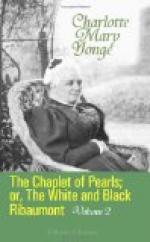Then Eustacie told him how the Italian pedlar had stolen her letters, and attempted to poison her child—the pedlar whom he soon identified with that wizard who had talked to him of ‘Esperance,’ until the cue had evidently been given by the Chevalier. Soon after the Duke had dispatched a messenger to say that the Chevalier de Ribaumont was on the way to demand his niece; and as it was a period of peace, and the law was decidedly on his side, Madame de Quinet would be unable to offer any resistance. She therefore had resolved to send Eustacie away—not to any of the seaports whither the uncle would be likely to trace her, but absolutely to a place which he would have passed through on his journey into Guyenne. The monastery of Notre-Dame de l’Esperance at Pont de Dronne had been placed there, as well as a colony of silk-spinners, attracted by the mulberry-trees of the old abbey garden. These, however, having conceived some terror of the ghosts of the murdered monks, had entreated for a pastor to protect them; and Madame la Duchesse thought that in this capacity Isaac Gardon, known by one of the many aliases to which the Calvinist ministers constantly resorted, might avoid suspicion for the present. She took the persecuted fugitives for some stages in an opposite direction, in her own coach, then returned to face and baffle the Chevalier, while her trusty steward, by a long detour, conducted them to Pont de Dronne, which they reached the very night after to Chevalier had returned through it to Nid de Merle.
The pastor and his daughter were placed under the special protection of Captain Falconnet, and the steward had taken care that they should be well lodged in three rooms that had once been the abbot’s apartments. Their stay had been at first intended to be short, but the long journey had been so full of suffering to Isaac, and left such serious effects, that Eustacie could not bear to undertake it again, and Madame de Quinet soon perceived that she was safer there than at the chateau, since strangers were seldom admitted to the fortress, and her presence there attracted no attention. But for Isaac Gardon’s declining health, Eustacie would have been much happier here than at the chateau; the homely housewifely life, where all depended on her, suited her; and, using her lessons in domestic arts of nursing and medicine for the benefit of her father’s flock, she had found, to her dismay, that the simple people, in their veneration, had made her into a sort of successor to the patroness of the convent. Isaac had revived enough for a time to be able to conduct the worship in the church, and to instruct some his flock; but the teaching of the young had been more and more transferred to her, and, as he ingenuously said, had taught her more than she ever knew before. He gradually became weaker through more suffering, and was absolutely incapable of removal, when an attack by the Guisards was threatened. Eustacie might have been sent




